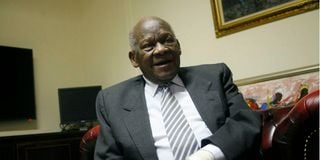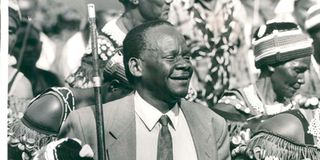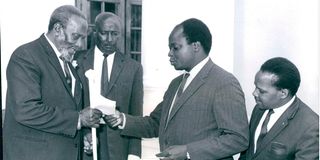Premium
Maina Wanjigi, ex-Minister who helped develop Gikomba market and Jua Kali industry, dies at 92

Former Cabinet minister James Maina Wanjigi.
What you need to know:
- He is credited with helping to found and develop Gikomba market in Nairobi, in addition to being touted as the father of Kamukunji settlers.
- He is also credited with establishing the famous Jua Kali industry in Shauri Moyo.
- Wanjigi served as Kamukunji MP for over 25 years after succeeding the late Tom Mboya, who was assassinated in 1969.
Maina Wanjigi, former Cabinet Minister and father of businessman Jimi Wanjigi, has breathed his last aged 92. His family confirmed that he died at Nairobi Hospital.
He is credited with helping initiate and develop Gikomba market in Nairobi, in addition to being touted as the father of Kamukunji settlers - having helped settle thousands of Mt Kenya squatters in Eastlands during Mzee Jomo Kenyatta's rule. For this, he was appointed Director of Settlement in the 1960s.
He is also credited with establishing the famous Jua Kali industry in Shauri Moyo.
In a statement, the family said the former Kamukunji MP, who also served as Cabinet minister for Agriculture, Tourism and Public Works, died while receiving treatment.
"We truly shall truly miss his respected presence in our lives," his son Jimi Wanjigi said, adding that he will be mourned as a family patriarch who "selflessly served his family, nation and the world".
Succeeded Tom Mboya

An undated photo of Maina Wanjigi.
The late Wanjigi served as Kamukunji MP for over 25 years after succeeding the late Tom Mboya, who was assassinated in 1969.
He was also the pioneer advocate for Free Primary Education when, in 1973, he beseeched the National Assembly to adopt the policy as a security for a prosperous and equal Kenya.
"Unless you have a good education to which every child has access, you cannot build a sound population and a sound nation. It's about time somebody got the message that we want free primary education. Let every child in this country be entitled to at least eight years of free primary education," he roared on the floor of the House.
His dream would later be implemented by Kenya's third President, Mwai Kibaki, in 2003.

An undated photo of the President Jomo Kenyatta receiving a cheque for Sh22,500 from Commerce and Industry Minister Mwai Kibaki at State House, Nairobi. Looking on is Maina Wanjigi, Executive Director of the ICDC.
President Daniel Moi picked him as chairman of Kenya Airways in 1979. As Mr Moi sought to cement his rule in Central Kenya region, he appointed Mr Wanjigi to the Cabinet.
Lowest moment in politics
His lowest moment in politics came knocking on his door in 1990, which marked a point of irreparable rapture with the ruling Kanu party and Moi's government.
In May 1990, while serving as Public Works Minister but out of the country for official duty, Nairobi City Council bulldozers descended on the expansive Muoroto shanties in his Kamukunji Constituency. Seen as his vote warehouse, the bulldozers flattened the slums, displacing more than 2,000 families in a move that he declared "an act of war with the poor and aimed at finishing me politically".
He would later issue a statement that "the derelict mud structures had been squeezed into smithereens as the earthmovers' roars camouflaged the cries of terrified children and adults".
He equated the Muoroto demolition with the colonial era Operation Anvil, condemning it as representative of the cruel and inhumane face of government "featuring remnants of colonial stooges and neo-colonialists".
Mr Wanjigi did not survive long for his stance. It got him in trouble with the Moi regime. To survive, he joined the proponents of multi-party democracy, leading to his expulsion from Kanu.
In a vicious crackdown that ensued, Mr Wanjigi was among the long list of political detainees who were incarcerated without trial, albeit in his case, he was in for only three days.
Mr Wanjigi allied himself to Kenneth Matiba's Ford Asili party but could not rejuvenate his political fortunes in the early era of multi-party politics from 1992.
He later took over the Kenya National Congress (KNC) party but politics did not work out for him this time, forcing him to retreat to private life of running his businesses, until when eternal rest came calling on Thursday.





